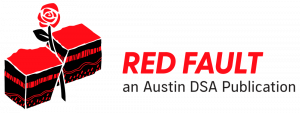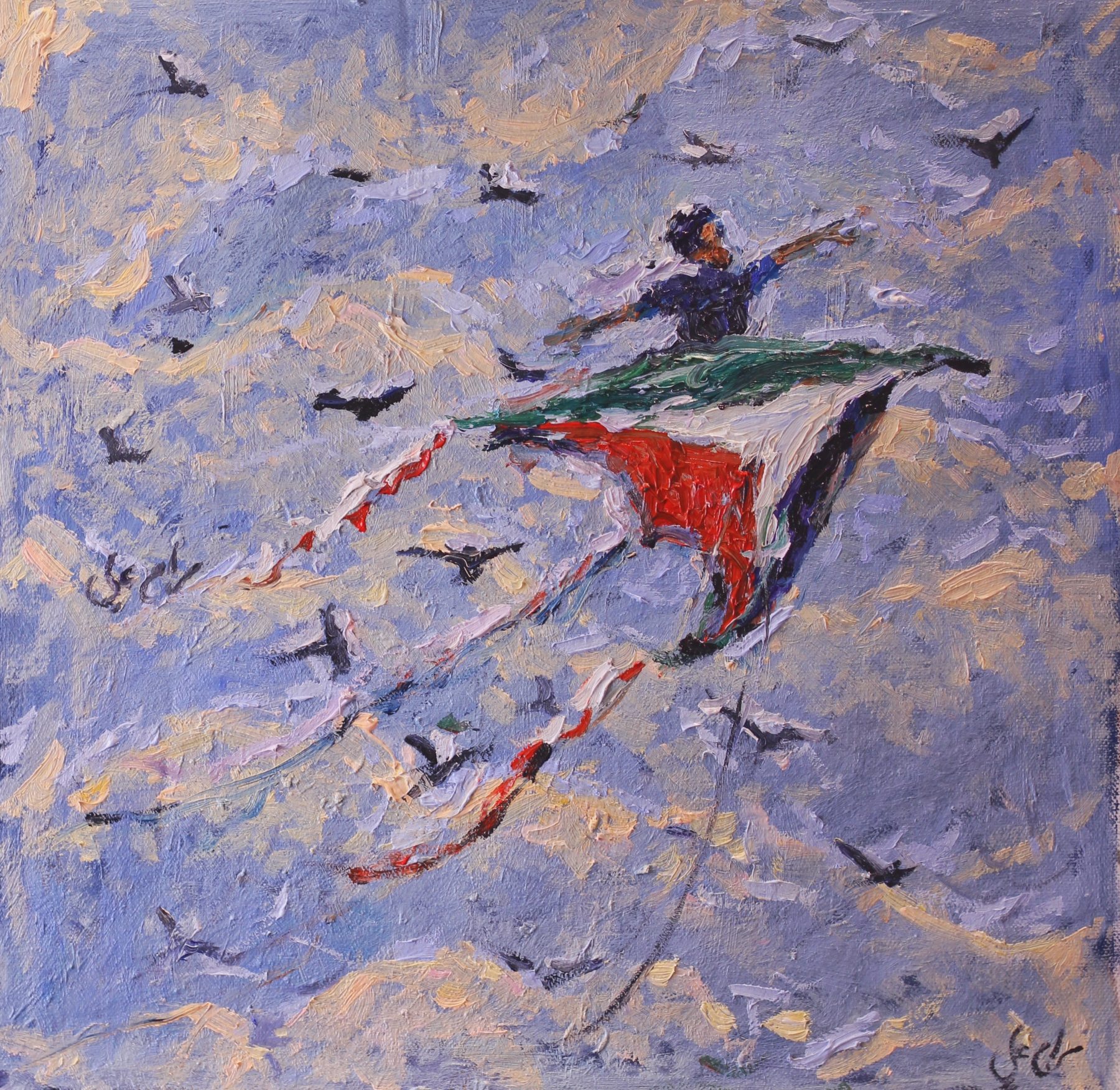by R.K. Upadhya
It is the two year anniversary of October 7th, of Palestine’s al-Aqsa Flood and the beginning of Israel’s genocidal response. Only two years; has it not felt like a lifetime? And is there anything left to say? It has been two years of mass murder and indiscriminate killings, with full backing from our government. Our protests and mobilizations have failed to halt the genocide, even as public opinion has shifted dramatically. Today, we are even more on the defensive, with domestic repression ratcheting up to unprecedented levels.
How do we maintain our sanity, our courage, and our commitment to the struggle in such times? How do we maintain hope when faced with such insurmountable evil?
I have never much liked poetry. But somehow, it has been poems that have brought me the most emotional and spiritual clarity over the past two years. I think this has less to do with the poems themselves, than who they were written by: refugees, prisoners, martyrs. Despite being written in the most unimaginably harsh conditions, their words are still somehow infused with hope and love – and a source of strength for all of us.
This poem, “I Grant You Refuge”, was written by the Palestinian poet, novelist, and teacher Hiba Abu Nada, on October 10th, 2023 – a few days after the al-Aqsa Flood, as an indiscriminate hail of missiles, bombs, and shells from the IDF were falling across Gaza:
I grant you refuge
in invocation and prayer.
I bless the neighborhood and the minaret
to guard them
from the rocket
from the moment
it is a general’s command
until it becomes
a raid.
I grant you and the little ones refuge,
the little ones who
change the rocket’s course
before it lands
with their smiles.
[…]
I grant you refuge
from hurt and suffering.
With words of sacred scripture
I shield the oranges from the sting of phosphorous
and the shades of cloud from the smog.
I grant you refuge in knowing
that the dust will clear,
and they who fell in love and died together
will one day laugh.
Ten days after she wrote this poem, Hiba was killed in her home in Khan Younis by an Israeli airstrike.
🇵🇸 🇵🇸 🇵🇸
Countless hundreds of other prominent Palestinian writers, poets, artists, and teachers have been murdered by Israel over the last two years. Thus, one small means of resistance is to defy this attempt at cultural erasure, and to protect and reproduce Palestinian art. In San Antonio, one effort around this that I was pleased to be a part of was the Palestine Cinematheque, which showcased documentaries, films, and shorts produced by Palestinians. On February 25th, 2024, we showcased “Where Should the Birds Fly”, a documentary produced in Gaza, centering on a young girl and her experiences during Israel’s 2008-2009 assault on Gaza. It was a harrowing film, with raw uncut images of death and destruction from Israel’s bombs; but also, of survival and resilience.
The final shot of “Where Should the Birds Fly” is of a little girl, an orphan, who the director met during the course of the filming. She’s playing on the beach with other orphans. The director closes out the movie reminiscing about her own childhood memories of the beach, and a simple poetic conversation that was about nothing – and yet, everything:
I remember when I played on the beach. Life seemed simple. We had fun. My dad would carry me on his shoulders.
Once I asked him, ‘where does the sun go?’ He told me, ‘the sun just shines somewhere else, so that others may see. A sunset here does not mean the sun is gone.’
🇵🇸 🇵🇸 🇵🇸
Out of necessity, Palestine has developed an incredible culture of resistance and resilience, particularly around its martyrs. It is very different here in the US, where we can struggle to talk openly about death. But things shifted on that day that we screened the documentary. February 25th was also the day that Aaron Bushnell, an active-duty member of the US Air Force, self-immolated in protest of US complicity in Israel’s genocide. His succinct words about what the genocide in Gaza meant rang out around the world: “This is what our ruling class has decided will be normal”.
Of course, Aaron was not just another soldier, but an anarchist and a member of San Antonio’s mutual aid network. Some of Aaron’s close friends and comrades were there during the screening that day. I still remember glancing over and seeing their stunned faces as they shared the news with each other. I wouldn’t know until later what had transpired, but I knew it was devastating.
It wasn’t until some time later that I realized I had known him too. I met him once, right when he was getting involved with the Left. He had come to the opening of a local socialist space, and we had struck up a conversation. I learned about his background and interests, and I gave him a quick spiel about the different niches of the Left and different things he could get involved in around the city, such as mutual aid work. I didn’t see him again, or think about him – until he became an international news story.
This is part of what we can expect, as the flames from Gaza spread, as repression deepens and our movements come under increasing fire. People you know may one day disappear forever; others you met once and forgot about, will suddenly re-emerge in headlines. This is where, as with many things, Palestine has been ahead of the curve; as Alex Birnel said at a speech at Aaron Bushnell’s vigil, Palestinians have always “celebrated, cherished, and remembered their martyrs”. We will have to learn to do the same, to embrace our martyrs, those among us who give up everything for the struggle.
Aaron had once planned to have a uniform-burning ceremony when he was able to finally quit the military. He wanted to recite the poem “The Empire Raised Me”, from Anansi’s Library:
I was a soldier for her before I knew her name
Raised to die before I fully knew mine
Crafted by hand for eternal war
Raised for combat as the empire’s ward
[…]
Now the muzzle is at my back
The boots are at my door
The guns are all racked
And like my ancestors before
A hail of bullets will set me free
Express one day delivery
From your state god to thee
Expect from your lord no loyalty
For I was raised a soldier.
🇵🇸 🇵🇸 🇵🇸
On September 25th, 2025, Assata Shakur passed away in Cuba, where she had been in exile since 1984. Her time in the revolutionary ‘60s and ‘70s was of an intensity that is hard to imagine in today’s US: a veteran of the Black Panther Party and the Black Liberation Army, godmother to Tupac Shakur, imprisoned for allegedly shooting down a police officer, broken out of jail by a communist militia. There can often seem a world of difference between Palestine and the US; but the truth is that the parallels have always been here.
Assata died free. But her vision of freedom and liberation never came to fruition. Was the vision even clear in her youth? Even if it wasn’t, she nonetheless gave the struggle her all. And this is the question we must ask ourselves as well: are we prepared to give the current struggle our all, even if victory will not happen in our lifetimes? Even if we can’t even imagine victory?
Assata might have posed the question a different way. She may have asked us if we believe in living. From her poem “Affirmation”, from her autobiography:
I believe in living.
I believe in the spectrum
of Beta days and Gamma people.
I believe in sunshine.
In windmills and waterfalls,
tricycles and rocking chairs;
And i believe that seeds grow into sprouts.
And sprouts grow into trees.
I believe in the magic of the hands.
And in the wisdom of the eyes.
I believe in rain and tears.
And in the blood of infinity.
[…]
I have been locked by the lawless.
Handcuffed by the haters.
Gagged by the greedy.
And, if i know any thing at all,
It’s that a wall is just a wall
and nothing more at all.
It can be broken down.
I believe in living
I believe in birth.
I believe in the sweat of love
and in the fire of truth.
And i believe that a lost ship,
steered by tired, seasick sailors,
can still be guided home
to port.
🇵🇸 🇵🇸 🇵🇸
On March 14, 2025, federal agents arrested Leqaa Kordia. She was a Palestinian student who had attended pro-Palestine protests at Columbia University, and the second one to be arrested, after Mahmoud Khalil. She was born in Jerusalem; over 100 of her family members have been killed in Gaza since October 7, 2023. She has now been imprisoned for over six months in the Prairieland Detention Facility, about a half-hour drive south of Fort Worth.
On July 4, a small group of anarchists and antifascists staged a noise demo outside of the prison. Something went awry, and shots were allegedly fired; now 17 comrades have been jailed, facing spurious terrorism charges. On September 22nd, Trump signed an executive order declaring “antifa” as a domestic terrorist organization. A few days later, Trump signed National Security Presidential Memorandum 7, declaring a national counter-terrorism initiative for the FBI to uncover and disrupt “anti-fascist” networks.
Five years after the George Floyd uprisings, and two years after the al-Aqsa Flood, there should be no more doubt: we all live under the same Empire. The savagery of the war against Palestine has spread far beyond the region; in the US alone, it is impossible to keep proper track of the pace and scale of state violence, and how quickly basic rights and norms once taken for granted are disappearing. There is no more pretense of human rights or the rule of law; no more pretense of the ruling class wanting to negotiate. As President Gustavo Petro of Colombia – a former guerrilla fighter and revolutionary – said earlier this year at a meeting of the Hague Group: “Gaza is simply an experiment by the ultra-rich…on how to respond to humanity’s rebellion.” Put differently: one way or another, the fate of Gaza is the fate of humanity.
On June 4, Leqaa wrote a poem and statement from her prison cell. I’ll end with her words. They speak for themselves. As all of our martyrs’ poems do.
Peace be upon you, and the mercy and blessings of God.
Peace be upon you, O Palestine.
Peace be upon Gaza, the steadfast and proud.
Peace be upon a people who taught the world
the meaning of patience, dignity, and resilience.
Peace be upon the mothers
who buried the remains of their children on street corners
—and still chose to keep Living.
Peace be upon the fathers
whose eyes wept for the first time
—and oh, what a brutal first time it was.
[…]
Peace be upon our noble martyrs, precious and beloved.
Peace be upon our free, glorious prisoners who are
charting the path to freedom.
[…]
To you, the free people across the world,
the rebels, the defiant, the unwavering
—peace be upon you and my deepest respect.
I write to you from a cold place, hoping my words
may carry a little warmth amid the tragedies, the suffering
and the unimaginable stories I witness here.
Still, I write with full certainty that we will all be freed
from this cruel injustice. And I believe, with all my heart
that I will meet you soon as a free woman—God willing.
From me—a granddaughter of the Nakba—to you,
the generation of return and the makers of freedom.
Accept my greetings and reverence.

